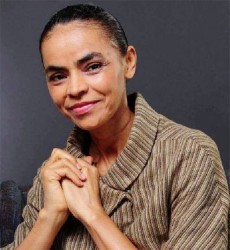SAO PAULO (Reuters) – Brazilians could make history this month by electing Marina Silva, the daughter of impoverished rubber tappers from the Amazon, as their first black president.

Yet Silva is trailing incumbent President Dilma Rousseff, who is white, among the half of voters who are of African descent.
That disadvantage, which contrasts with US President Barack Obama’s overwhelming support from African-Americans in the 2008 and 2012 elections, could cost Silva victory in this extremely close election.
The reasons behind Silva’s struggles speak volumes about Brazil’s history, its complex relationship with race, and the recent social progress that has made Rousseff a slight favourite to win a second term despite a stagnant economy.
In recent weeks, Reuters interviewed two dozen Brazilians of colour in three different cities. Many said they would be proud to see Silva win – especially in a country where people of colour have historically been underrepresented in government, universities and elsewhere.
Yet they also said they were more focused on the economy than any other factor. Since taking power in 2003, Rousseff’s leftist Workers’ Party has made enormous strides in reducing poverty – especially among blacks.
“No one wants to go back to the past,” said Gustavo Leira, 71, a retired public servant in Brasilia. Silva’s race is important, he said, “but it’s not the most important thing.”
Silva, who is running on a more centrist, market-friendly platform, has mostly avoided the subject of race, reflecting a long tradition in Brazilian politics and society. Brazilians overwhelmingly shy away from speaking about race, preferring to speak in terms of class instead.
Over the centuries, more than 10 times as many African slaves were brought to Brazil than to the United States. Brazil was the last country in the Americas to abolish the practice, in 1888. Today, blacks are more than three times as likely as whites to suffer from extreme poverty.
Asked in an interview with Reuters last week what it would mean to be Brazil’s first black president, Silva replied: “Not just (that) … I’d also be the first environmentalist.”
“I’m very proud of my identity as a black woman,” she continued. “But I don’t make political use of my faith, or my colour. I’m going to govern for blacks, whites, (Asians), believers, non-believers, independent of their colour or social conditions.”
Silva’s stance is consistent with her especially inclusive brand of politics, which has brought together evangelical Christians, web-savvy urban youths, banking tycoons, and others.
But it has also mystified some political analysts and voters who say that, by not playing up her roots more, she is missing a golden opportunity to better connect with a huge demographic group that is mostly supporting her opponent.
A senior adviser to Rousseff called Silva’s reluctance to discuss her race “the biggest mystery of this campaign.”
Some, especially the young, are urging Silva to be more vocal about her background. They say that a dramatic rise in the enrollment of blacks at universities, thanks in part to new racial quotas, has fuelled a growing racial consciousness. Other prominent black leaders have also emerged, including former Supreme Court Chief Justice Joaquim Barbosa, who has urged Brazilians to speak more honestly about racial issues.
But change has been slow. Indeed, although most Brazilian pollsters ask respondents about their race and break down results accordingly, Rousseff’s lead among blacks has barely been commented upon in local media.
Regina Collson, a 23-year-old university student, said she has tried to convince classmates to vote for Silva by emphasizing how her African background, and her impoverished youth, would mark a “big change” from politics as usual.
“She would bring a different perspective,” Collson said. “But people aren’t talking about it (that way). It makes me mad.”




